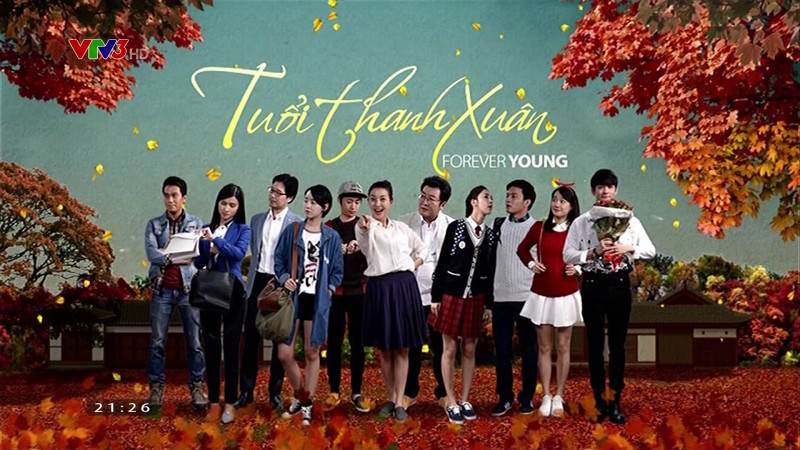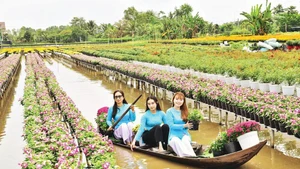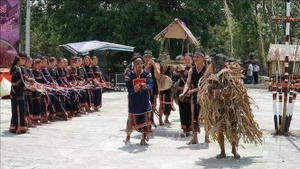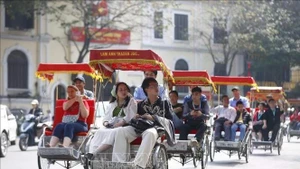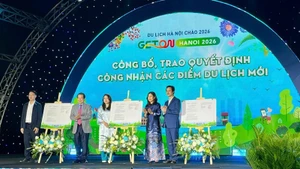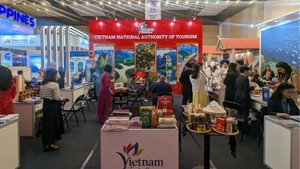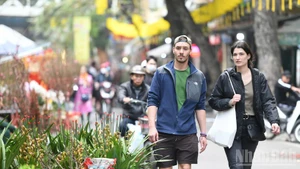With a series of TV film projects - including ‘Lang Hoa Tinh Yeu’ (Love Flower Basket) by Ho Chi Minh City Television Film Studios (TFS) and Republic of Korea (RoK)’s FNC, ‘Mui Ngo Gai’ (Scent of Coriander) by Viet Family (VIFA) Film Studio and RoK’s CJ Media - collaborative TV films are considered a good opportunity to showcase Vietnam’s culture and stimulate tourism.
Good Start
The latest film, ‘Tuoi Thanh Xuan’(Forever young), produced by Vietnam Television Film Centre (VFC) and CJ E&M, one of the Republic of Korea’s leading entertainment and media corporations, premiered on Vietnam Television in December, 2014.
The 36-episode TV series promptly became a phenomenon of the small screen with high ratings. The series was also nominated for a 2015 VTV Impression Award in three categories: Impression New Film, Impression Actor and Impression Actress. At the end of June, 2015, the series was also screened in RoK and in ten other Asian countries. The series tells stories about the lives, friendships and loves of Vietnamese and Korean young people. Experiencing every taste of love, happiness, failure and sorrow in their youth, they still nurture dreams to fly high in life.
Vietnam’s natural beauty, including well-known sites in Da Nang and Hanoi’s Sword Lake, Long Bien Bridge and the Old Quarter, appeared in the series as part of an effort to showcase Vietnam abroad. The series’ next part will feature even more of Vietnam’s tourist attractions.
Two years ago, a 120-minute film titled ‘Nguoi Cong Su’ (Fellow-worker) was the first jointly-produced film project of Vietnam Television (VTV) with a foreign partner. The film was a joint effort between VTV and the Tokyo Broadcasting System (TBS) from Japan to mark 40 years of diplomatic relations between Vietnam and Japan. The film about famous 20th-century Vietnamese nationalist Phan Boi Chau was received enthusiastically by audiences in Vietnam and Japan, and won five prizes at the 18th National Film Festival. The film not only featured Vietnam’s culture and people, but also offer audiences an opportunity to see the beauty of Hanoi, Hue ancient capital, Hoi An ancient city and the world natural heritage site, Ha Long Bay.
Following the success of the first project, VTV and TBS are co-ordinating to produce a second project, ‘Khuc Hat Mat Troi’ (The Sun’s Song). The 24-episode series features Da Lat and Vietnam’s traditional embroidery as the main background for the film. After being screened in Vietnam and Japan, the film will also be screened in many other countries.
With similar cultures and people, partnering with Japan and the RoK is politic decision for Vietnam’s television film industry. Both countries are strong in TV film producing and the export sector. Through the collaborative project, Vietnamese film makers have an opportunity to learn from their partners; the jointly-produced film project is considered the most effective way to bring Vietnamese films to the world market.
According to Director, Meritorious Artist Do Thanh Hai, Director of the Vietnam Television Film Centre (VFC), as a collaborative film project under VTV, the VFC is planning some new projects for broader markets. Russia and France, having close cultural relations with Vietnam, will be the next partners.
Great expectation
From the success of the RoK’s films, the VFC has awoken to the international standard for TV films’ and their benefits in promoting the beauty of Vietnam’s landscapes, culture and people. However, there are few Vietnamese films featuring Vietnam’s tourism and culture.
Director Hai expressed his hope that more Vietnamese films would not only showcase the beauty of Vietnam’s landscapes, culture and people, but also attract visitors to Vietnam.
Additionally, with the positive effects from the three previous films, management agencies need to consider films as a means of promoting tourism, according to Director Hai.
Vietnam hopes to see more films produced to spread awareness of Vietnam’s land and culture.
